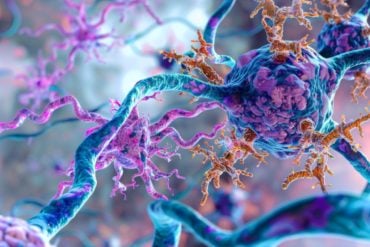Summary: The year 2023 witnessed groundbreaking discoveries in neuroscience, offering unprecedented insights into the human brain.
From animal-free brain organoids to the effects of optimism on cognitive skills, these top 10 articles have unveiled the mysteries of the mind.
Research revealed the risks of dietary trends like “dry scooping” and the impact of caffeine on brain plasticity. Additionally, the year showcased the potential of mushroom compounds for memory enhancement and the unexpected influence of virtual communication on brain activity.
Key Facts:
- Animal-free brain organoids were developed at the University of Michigan, providing a more accurate model for studying neurodegenerative diseases.
- Excessive optimism was linked to poorer decision-making, especially in financial matters, according to research from the University of Bath.
- Misophonia, an intolerance to certain sounds, affects nearly 1 in 5 adults, often leading to feelings of helplessness.
Source: Neuroscience News
This year, we’ve seen some massive breakthroughs in neuroscience research that have helped us gain better insights into the workings of our brains and provided new hope for the millions of individuals who suffer from complex neurological disorders.
With greater adoption of modern technologies, such as artificial intelligence and more extensive use of brain organoids, researchers have made some remarkable discoveries in 2023, which set the foundations to delve deeper into our understanding of the brain.
Over the past year, we have covered the latest and greatest neuroscience breakthroughs and shared the latest developments helping shape this field. Below are the top ten neuroscience research articles of 2023 that have captured the imaginations of our readers.
We would like to thank all our readers, both old and new, who have helped share our news and supported us this past year. We truly appreciate all of you and hope you will return throughout 2024 for more exciting, daily updates from the world of neuroscience and cognitive sciences.
In no particular order, here are our top 10 neuroscience research articles of 2023.
Happy New Year!
10 – Lab-Grown Human Brain Organoids Go Animal-Free
Back in July, we shared an impressive breakthrough from researchers at the University of Michigan who created a new method to generate brain organoids, or mini-brains. These new organoids are created free of animal cells and show promise for more accurate research of neurodegenerative diseases.
The new method for creating these organoids uses engineered extracellular matrixes, completely free of any animal components. This helps overcome the variability issues found in more traditional methods of generating organoids, and helps improve neurogenesis of the new mini-brains.
The researchers say this new method helps to replicate natural human brain conditions more accurately, allowing for the potential to reprogram the cells of patients suffering from a range of neurodegenerative disorders.
This will allow for developing more personalized methods of treating neurological diseases and understanding the progression of neurodegeneration on a patient-by-patient level.
9 – Optimism Linked to Poor Decision-Making and Lower Cognitive Skills
Earlier this month, we reported on new findings by researchers at the University of Bath who investigated the effects of optimism on cognitive skills. Their findings revealed those with excessive optimism often display poorer decision-making skills, especially when it comes to financial matters.
Those with higher cognitive abilities, they found, tend to be more realistic and pessimistic when it comes to their future expectations. By contrast, those with lower cognitive skills tend to be more optimistic and show reduced ability when it comes to fluid and numeric reasoning.
In terms of financial success, those who are more optimistic tend to indulge in risky financial behaviors, such as failing to save and plan ahead for their financial futures. They are also more prone to debt and higher consumption than those who are more pessimistic.
While a healthy level of optimism is good for a person’s mental health and well-being, being overly optimistic can lead to risky behaviors, especially when it comes to money and securing personal futures.
8 – Dry Scooping: A Risky Dietary Practice Common Among Adolescents and Young Adults
One of our most popular articles this year concerned a phenomenon that captured social media sites in early 2023. While some memes and fads can be entertaining and fun, the “dry scooping” craze, often undertaken by young men, proved to have extremely negative health effects.
Dry scooping is a novel dietary practice that involves a person consuming protein powders for pre-workout drinks without adding liquids. Researchers found those more likely to embark on this dietary fad were more likely to have body dysmorphia and a “pathological pursuit” to achieve muscularity.
Dry scooping was associated with a plethora of negative health outcomes, including digestive issues, cardiac abnormalities, and an increased risk of powder inhalation.
More public education on the dangers of dry scooping is needed to help prevent people from risking their lives to embark on this fad, the researchers said.
7 – Brain Brew: How Daily Coffee Habits May Affect Brain Plasticity and Learning
Back in November, we presented some less-than-positive news for caffeine lovers everywhere! A new study shed light on the link between high caffeine consumption and a potentially negative impact on brain plasticity and learning outcomes.
Researchers found those who regularly and frequently consume caffeine products may have diminished long-term potentiation (LTP), a vital process for learning and memory in the brain.
As suggested, diminished LTP experienced by those with a diet including high caffeine consumption impacts brain plasticity and could have a negative effect on cognitive skills in the long run.
This is especially concerning for those who are under magnetic brain stimulation treatments, as LTP induction is required for effective outcomes. Therefore, caffeine use may impede the success of rTMS therapies.
Researchers say that this study requires further investigation to fully determine the effects of caffeine consumption on neuroplasticity and cognition.
However, it is still safe to sip your favorite caffeinated beverages from time to time. Other research presented this year has identified positive effects of caffeine consumption on health and reducing Parkinson’s risk for those with a genetic predisposition to the neurodegenerative disease.
In January, we reported on new research from scientists at Emory University which found Levodopa, a drug commonly used for the treatment of Parkinson’s disease, reverses the effects of neuroinflammation on the reward system in the brain and can help to alleviate symptoms of depression.
Previous research found neuroinflammation can result in a decreased release of dopamine in the ventral striatum, an area of the brain associated with reward. Levodopa not only increases dopamine levels in the brain, it was also shown to improve functional connectivity in the reward system for depressed patients with higher levels of C-reactive protein, a blood biomarker for inflammation.
Researchers say this study has two major profound implications: depressed patients with high levels of inflammation may specifically respond to drugs that increase dopamine levels, and functional connectivity in the reward system may serve as a biomarker for the effects of inflammation on the brain.
5 – Aggression Is A Result of Self-Control, Not Lack Thereof
One article that generated a lot of discussion this year was presented by researchers from Virginia Commonwealth University back in July concerning the root of aggressive behaviors.
For a number of years, psychologists have claimed that aggressive behavior stems from poor self-control. However, the researchers at VCU found contradictory evidence to this claim, reporting instead that aggression is not a result of losing control, but is instead often a deliberate and controlled act with the intent of the aggressor to maximize retribution on their victims.
The researchers found that current methods of treating aggressive behaviors where the focus is on minimizing aggressive tendencies by boosting self-control may have the opposite effect than intended. Instead, the researchers argue, such treatments may actually enable most aggressive people to execute their violent behaviors better.
Critically, the researchers also provided new insight into the neurobiological underpinnings of aggression, finding the brain’s prefrontal cortex, an area associated with self-control, shows increased activation during moments of aggression. This further debunks the myth that aggressive behavior is a result of poor self-control and is, in fact, intentional and premeditated.
4 – Nearly 1 in 5 Adults May Have Misophonia, Experiencing Significant Negative Responses to Sounds
Does the sound of a person chewing bother you, making you feel trapped or helpless when you hear the noise? You’re not alone. You may be suffering from misophonia, or an increased intolerance to certain sounds.
While many people feel frustrated or annoyed when they hear certain sounds, 18% of the sample studied for this research reported feeling helpless when exposed to “trigger sounds.” They also tended to blame themselves for their reaction to the auditory stimuli and felt as though their symptoms caused them to miss out on certain activities due to the impact of the sounds.
Researchers say that currently, there is little awareness of misophonia, causing sufferers to feel alone and misunderstood. They say more must be done to raise awareness of this phenomenon.
3 – Mushrooms Magnify Memory by Boosting Nerve Growth
Last February, researchers from the University of Queensland revealed that the active compound from the edible Lion’s Mane mushroom may have a positive impact on neurogenesis and overall memory. Lion’s mane has been used for centuries in traditional Chinese medicine to treat a range of disorders, from digestive issues to cancer.
In preclinical trials, the researchers found the active compounds in Lion’s mane enhanced new neuron growth in the hippocampus, an area of the brain associated with memory and learning. An increase in memory formation was also reported following exposure to the compounds.
Researchers say this discovery may pave the way for the development of new treatments for neurodegenerative diseases associated with memory loss, including Alzheimer’s disease and other dementias.
Recent research published in the open-access journal, PLOS ONE linked how people pay attention to faces to personality traits and psychopathological disorders.
Those who tend to focus more on faces tend to express the Big Five personality traits of openness, agreeableness, and extraversion, the researchers found. Additionally, those more likely to focus on faces tend to be more empathetic than those who pay less attention to faces.
By contrast, those who paid little attention to faces were more likely to suffer from a psychological disorder, specifically, depression, alexithymia, or anxiety.
In conclusion, the researchers reported face preference may be related to both personality and mental health. The findings could prove a useful biomarker for mental health professionals to identify those at risk of depression-related disorders.
1 – Zoom Conversations vs In-Person: Brain Activity Tells a Different Tale
During the recent COVID-19 pandemic, more and more people turned to services like Zoom to remain in contact with business colleagues, friends, and loved ones. While the tool helped millions of people worldwide maintain social interactions during periods of isolation, researchers found online communication had an impact on neural activity.
When communicating online via platforms like Zoom, researchers observed users had suppressed neural signals. However, when embarking on face-to-face or in-person conversations, neuroimaging revealed heightened brain activity and more coordinated neural responses between the participants. In-person communication was also associated with greater arousal and social cue exchange.
The findings highlight the importance of in-person social interactions for effectively engaging our social neural circuits.
Thank you for taking the time to catch up on the top Neuroscience News articles of 2023. We look forward to providing you with all the groundbreaking research throughout 2024 and beyond!
About this neuroscience research news
Author: Neuroscience News Communications
Source: Neuroscience News
Contact: Neuroscience News Communications – Neuroscience News
Image: The image is credited to Neuroscience News








